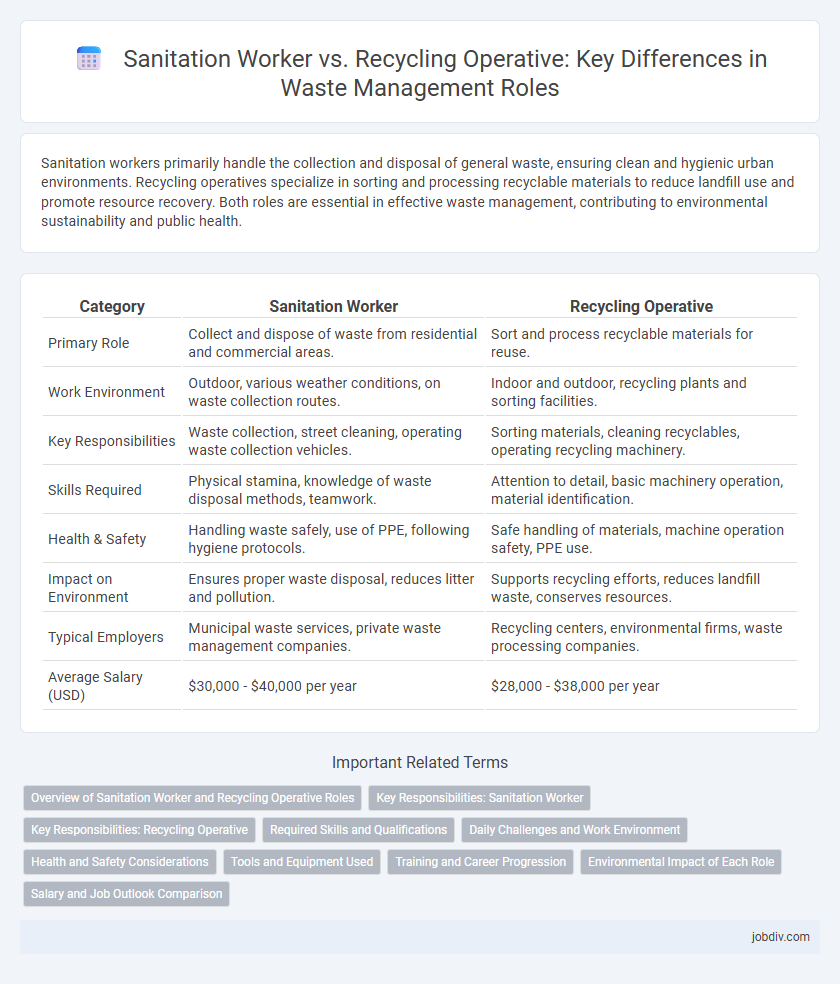Sanitation workers primarily handle the collection and disposal of general waste, ensuring clean and hygienic urban environments. Recycling operatives specialize in sorting and processing recyclable materials to reduce landfill use and promote resource recovery. Both roles are essential in effective waste management, contributing to environmental sustainability and public health.
Table of Comparison
| Category | Sanitation Worker | Recycling Operative |
|---|---|---|
| Primary Role | Collect and dispose of waste from residential and commercial areas. | Sort and process recyclable materials for reuse. |
| Work Environment | Outdoor, various weather conditions, on waste collection routes. | Indoor and outdoor, recycling plants and sorting facilities. |
| Key Responsibilities | Waste collection, street cleaning, operating waste collection vehicles. | Sorting materials, cleaning recyclables, operating recycling machinery. |
| Skills Required | Physical stamina, knowledge of waste disposal methods, teamwork. | Attention to detail, basic machinery operation, material identification. |
| Health & Safety | Handling waste safely, use of PPE, following hygiene protocols. | Safe handling of materials, machine operation safety, PPE use. |
| Impact on Environment | Ensures proper waste disposal, reduces litter and pollution. | Supports recycling efforts, reduces landfill waste, conserves resources. |
| Typical Employers | Municipal waste services, private waste management companies. | Recycling centers, environmental firms, waste processing companies. |
| Average Salary (USD) | $30,000 - $40,000 per year | $28,000 - $38,000 per year |
Overview of Sanitation Worker and Recycling Operative Roles
Sanitation workers are responsible for collecting, transporting, and disposing of waste to maintain public health and cleanliness. Recycling operatives focus on sorting, processing, and managing recyclable materials to reduce landfill use and promote environmental sustainability. Both roles require physical labor and adherence to safety protocols but differ in their primary objectives and operational environments.
Key Responsibilities: Sanitation Worker
Sanitation workers are primarily responsible for collecting and disposing of waste to maintain public cleanliness and prevent health hazards. Their duties include operating garbage trucks, handling hazardous materials safely, and ensuring timely removal of residential and commercial refuse. These tasks are essential for effective waste management and environmental sanitation.
Key Responsibilities: Recycling Operative
Recycling Operatives are responsible for sorting, processing, and managing recyclable materials to ensure efficient waste recovery and reduce environmental impact. Their tasks often include operating machinery, inspecting materials for contamination, and preparing recyclables for transportation to processing facilities. This role prioritizes maximizing material reuse and minimizing landfill waste through diligent handling and adherence to environmental regulations.
Required Skills and Qualifications
Sanitation workers require skills in waste collection, manual handling, and operating sanitation equipment, often needing physical stamina and a high school diploma or equivalent. Recycling operatives must possess knowledge of sorting processes, contamination identification, and operation of recycling machinery, with qualifications ranging from on-the-job training to specialized certifications in environmental management. Both roles demand attention to safety protocols and environmental regulations to ensure effective waste management and sustainability.
Daily Challenges and Work Environment
Sanitation workers face daily challenges such as heavy manual labor, exposure to hazardous waste, and irregular hours, often working in urban areas with high traffic and inclement weather conditions. Recycling operatives, meanwhile, handle sorting recyclable materials in noisy, fast-paced environments with strict health and safety protocols to manage contamination risks. Both roles demand physical stamina and resilience, but recycling operatives typically work indoors on processing lines, contrasting with the more outdoor-based, collection-focused sanitation work.
Health and Safety Considerations
Sanitation workers face high risks of exposure to hazardous waste, sharp objects, and biohazards, necessitating strict use of personal protective equipment (PPE) and adherence to sanitation protocols to prevent infections and injuries. Recycling operatives must manage the dangers of handling broken glass, heavy machinery, and chemical contaminants, requiring comprehensive training in equipment operation and workplace safety standards. Both roles prioritize minimizing occupational hazards through routine safety audits and compliance with health regulations to ensure worker well-being in waste management environments.
Tools and Equipment Used
Sanitation workers primarily rely on heavy-duty tools such as garbage trucks, compactors, and protective gear including gloves and high-visibility clothing to efficiently collect and dispose of waste. Recycling operatives utilize sorting conveyors, balers, shredders, and manual hand tools to separate and process recyclable materials for further use. Both roles demand specialized equipment tailored to their distinct responsibilities within waste management systems.
Training and Career Progression
Sanitation workers typically undergo basic health and safety training with on-the-job experience, allowing for advancement into supervisory roles or specialized waste management positions. Recycling operatives receive more technical training in material sorting, machinery operation, and environmental regulations, enabling progression into quality control, logistics, or sustainability coordinator roles. Both careers offer pathways for growth, but recycling operatives often require more specialized knowledge, enhancing opportunities in environmental and circular economy sectors.
Environmental Impact of Each Role
Sanitation workers primarily reduce environmental hazards by efficiently collecting and disposing of waste, preventing pollution and disease spread in communities. Recycling operatives contribute significantly by diverting reusable materials from landfills, decreasing raw material extraction, and lowering greenhouse gas emissions. Both roles are essential in promoting sustainable waste management and mitigating the overall environmental footprint.
Salary and Job Outlook Comparison
Sanitation workers earn an average annual salary of $35,000, with job growth projected at 4% over the next decade, driven by increasing urban waste management needs. Recycling operatives typically receive around $30,000 yearly, but their employment outlook is stronger, expected to grow by 8% due to rising environmental regulations and sustainability efforts. The recycling sector offers more dynamic opportunities linked to green initiatives, while sanitation remains crucial for maintaining public health infrastructure.
Sanitation Worker vs Recycling Operative Infographic

 jobdiv.com
jobdiv.com